Yesterday's retreat at Whispering Pines was not as retreaty as the one I do each January. There was no snowshoeing, yoga, or reading in front of a window while night falls over a mountain meadow. But I did get lunch and a thirty-minute walk, so I can't complain.
Cynthia Lord was the author/mentor and the reason I went because she was giving a talk on plotting, which is hell on earth for many writers, myself included. Now, Cynthia Lord has only written three books, and two of them are just coming out this year. Yet she's a very popular speaker at both schools and literary events. Some jaded types might say that happens when your one novel is a Newbery Honor book. I think it's more likely due to the fact that she is a very fine speaker. She was remarkable with both content and presentation. She also made the best use of PowerPoint of anyone I've ever seen. I'm talking both in terms of slides supporting content and ability to use the program.
Now the group critique I took part in during the afternoon was very interesting for a couple of reasons. First, I have to say that the material I heard yesterday was much better than I expected. I was a member of a writers' group for a few years earlier in this decade. That group was made up primarily of unpublished writers, which I suspect was the case yesterday, too. The quality of what I was hearing yesterday was better than what I often heard in my old group. I don't know if this was because there are many more options for beginning writers to learn craft now and I'd see that in any group critique situation or if these were all SCBWI members and, as such, were more likely to avail themselves of such opportunities. Second, these people were also very sophisticated readers and could express themselves confidently. (Probably more so than I did.) I know that at least three of the people there were members of writers' groups and were experienced at giving feedback.
As a result of the discussion of my offering--a few pages from the 365 Story Project--I am going to make some significant changes on Day One, which shouldn't be too difficult to do. I'm also going to change the name from Middle Ridge Road to A Year on Middle Ridge Road. So it was a productive day for me.
Author Gail Gauthier's Reflections On Books, Writing, Humor, And Other Sometimes Random Things
Sunday, March 07, 2010
An Unfortunate Coincidence
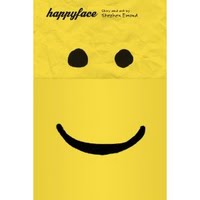
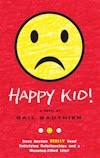
While I was at a writers' retreat yesterday, I learned about a new book called Happy Face by Stephen Emond. The cover and title couldn't help but catch my eye, given how similar they are to Happy Kid!.
Then I read what the book is about--"a shy, artistic boy who decides to reinvent himself as a happy-go-lucky guy after he moves to a new town." Happy Kid! is about a boy who is "friendless, mistakenly taking super-difficult accelerated courses, and infamous for allegedly being involved in a violent "incident" on the bus" "...but a self-help book from his well-meaning mother changes all that. Magically, the book seems to know all about him. And it wants him to improve his life."
Happy Kid! was published four years ago, which is probably a generation in publisher years. Nonetheless, it's hard not to be frustrated.
Happy Face's author even lives in my state.
UPDATE: After fifty minutes or so of exercise and a hot shower, I have started moving on. Also, is the Happy Face cover supposed to be a paper bag? Because that would make it different. Let's say it's a paper bag. Yeah. Ommmm.
Friday, March 05, 2010
If You Have All The Time In The World...
...you might want to look at The Top 100 Creative Writing Blogs and Top 100 Blogs to Improve Your Writing in 2010, which I found at a month-old post at Practicing Writing. I look at a few of the editor/agent/writer business blogs I follow three times a week while I'm eating. I eat more than three times a week, but I do other things during other feeding times. What I'm trying to get at, here, is that the three-times-a-week schedule explains why that post is so old. Not being seriously insane, I'm not even going to try to look at those 200 blogs. At the rate of a few blog posts a day, three days a week, I'd be stuck on the January/February 2010 posts until...ah...ah... I don't have time to do the math.
Maybe if Civil Guy sees this, he'll do it.
Maybe if Civil Guy sees this, he'll do it.
Prologues...Bleh
As a reader, I must say I agree with Why Prologues Often Don't Work at Pub Rants. I feel the same way about epilogues.
Thursday, March 04, 2010
Ah, Yes. Time Suck.
Varian Johnson, who appears to be a structures guy (a term you'd be familiar with if you belonged to a civil engineering family) as well as a YA novelist, did a guest post at Justine Larbalestier's blog on the subject of time suck.
Ah, yes. Time suck.
Back when I had more time, I wasted so much of it. Back ten months ago, the Internet was my major time suck. I had to kill an hour or more each morning before I began work. I called it my transition time or prep time. Then I kept going back to news' sites and e-mail over and over again during the day.
Because of the family problems that arose last year, I have much less time. As a result, with the three days a week I have left to work, I've had to set up office hours just as Johnson describes. The Internet and e-mail are not part of office hours, at least not the morning office hours. I don't do any of that until after I've gotten some work done. When my family members call me on those days, I keep telling them I'm working. I sometimes e-mail people in the evening to tell them, "I'll be working tomorrow. I'll get back to you tomorrow night" as a little hint that they should leave me alone. (People who need hints rarely take them, I've found.) I don't do Internet research for other family members' health problems during office hours. I don't do personal paper work during office hours. I don't do personal financial work during office hours. I must have been spending a lot of my work time on these kinds of tasks because I'm doing them in the evenings now, and I find that I don't have anywhere near as much time to read blogs and listservs, which is what I used to do in the evenings.
Oddly enough, though, now that I have less time to work, I find that I'm staying on task much better. I can't get everything done, but at least I know I'm working.
Johnson talks about making time however you can. The thing you have to accept about that is when you make time to do one thing that means you aren't going to be able to do something else. I made time to work during the day by doing personal stuff at night, which means I can't be as connected to the kidlitosphere as I used to be.
I am confident that someday someone will find a way to get more hours in the day and more days in the week. I hope I live to see it.
Again, I found the Varian Johnson post through Cynsations.
Ah, yes. Time suck.
Back when I had more time, I wasted so much of it. Back ten months ago, the Internet was my major time suck. I had to kill an hour or more each morning before I began work. I called it my transition time or prep time. Then I kept going back to news' sites and e-mail over and over again during the day.
Because of the family problems that arose last year, I have much less time. As a result, with the three days a week I have left to work, I've had to set up office hours just as Johnson describes. The Internet and e-mail are not part of office hours, at least not the morning office hours. I don't do any of that until after I've gotten some work done. When my family members call me on those days, I keep telling them I'm working. I sometimes e-mail people in the evening to tell them, "I'll be working tomorrow. I'll get back to you tomorrow night" as a little hint that they should leave me alone. (People who need hints rarely take them, I've found.) I don't do Internet research for other family members' health problems during office hours. I don't do personal paper work during office hours. I don't do personal financial work during office hours. I must have been spending a lot of my work time on these kinds of tasks because I'm doing them in the evenings now, and I find that I don't have anywhere near as much time to read blogs and listservs, which is what I used to do in the evenings.
Oddly enough, though, now that I have less time to work, I find that I'm staying on task much better. I can't get everything done, but at least I know I'm working.
Johnson talks about making time however you can. The thing you have to accept about that is when you make time to do one thing that means you aren't going to be able to do something else. I made time to work during the day by doing personal stuff at night, which means I can't be as connected to the kidlitosphere as I used to be.
I am confident that someday someone will find a way to get more hours in the day and more days in the week. I hope I live to see it.
Again, I found the Varian Johnson post through Cynsations.
This Speaks To Me
Strong Writers Do This at Writer's First Aid could have had my name on it. In it Kristi Holl talks about self-study programs, an idea she says comes from a book called The Art of War for Writers. I've done self-study programs in the past, and I can totally get behind the idea of writers as warriors.
In the comments to this blog post, someone talks about creating scene cards for novels you're reading, not writing. I've read about that. It's supposed to help writers develop a sense of how plots work. (Hmmm. A little muscle memory for plot, since we were talking about warriors in the last para?) I was going to do it a while back. I was going to use a notebook, had it next to my bed so I could make scene notes while I read. And that's as far as I got with that particular self-study program.
Hmmm. Maybe I'll try doing this particular self-study program here at Original Content. I could try working out the plot points in some books I'm reading, trying to develop some plotting muscle memory.
I found Writer's First Aid by way of Cynsations.
In the comments to this blog post, someone talks about creating scene cards for novels you're reading, not writing. I've read about that. It's supposed to help writers develop a sense of how plots work. (Hmmm. A little muscle memory for plot, since we were talking about warriors in the last para?) I was going to do it a while back. I was going to use a notebook, had it next to my bed so I could make scene notes while I read. And that's as far as I got with that particular self-study program.
Hmmm. Maybe I'll try doing this particular self-study program here at Original Content. I could try working out the plot points in some books I'm reading, trying to develop some plotting muscle memory.
I found Writer's First Aid by way of Cynsations.
Wednesday, March 03, 2010
Sally Goes Everywhere
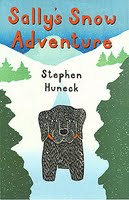
Recently I happened upon some of the late Stephen Huneck's picture books about Sally, a dog that really got around. Though Huneck did attend the Massachusetts College of Art, according to a New York Times article, more than one account says he taught himself to carve and do woodcut prints, making him more of a folk artist than you usually find these days. The Times article called him an outsider artist and said that at the height of his success he was running a multi-million dollar business.
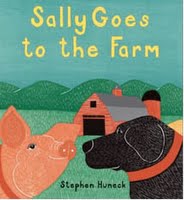
My favorite of the Sally books that I've seen so far is Sally Goes to the Farm. Sally's Snow Adventure would have beat it, but it has a strange shift in the doggy point-of-view from first to third person, something the publisher should have caught.
You don't see much in the way of humans in these books. The dogs take part in human activities--driving tractors, riding on sleds--but they're always dogs. They never wear clothes or hold jobs. These are simple stories that are illustrated with a strong style. I can imagine a family collecting all of them and wearing them out with repeated readings.
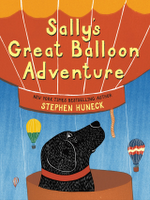 Sally's Great Balloon Adventure will be published next month.
Sally's Great Balloon Adventure will be published next month.
Tuesday, March 02, 2010
I'm Probably The Same Person No Matter What I'm Doing
Today at taekwondo I was training with Gen, who is a lovely woman, very sensitive to others' needs, very caring. She is one of those martial arts students who is always encouraging others during drills and even when sparring. In spite of the fact, by the way, that she is an imposing, if not frightening, sparring partner.
Anyway, I am not any of those things. I am not an imposing, forget about a frightening, sparring partner. I'm also not the kind of martial arts student who encourages others with comments about how well they're doing. I'll offer to stop if I think someone is going to pass out or ask if people are okay if I think they're injured. I'm not a monster. But I'm not the kind of training partner who goes, "Good! Good! You're doing great! Don't forget to breath! Only another half minute! You can do it!" My attitude tends to be, "Breath or not. I don't care. When do we get to do poomse?"
While training with kind and generous Gen this morning, I started worrying that my sucky attitude in the dojang might be representative of how I behave in other parts of my life--say, during group writing critiques. This is significant because this Saturday I'm attending the day program of the Whispering Pines Writers' Retreat, which includes informal group critiques in the afternoon. It's been years since I've been in a group critique. In fact, I haven't done it since I was one of the speakers at Whispering Pines four years ago. I'm very fearful I'll sit there with a mindset that will be the group critique equivalent of "Breath or not. I don't care," and everyone will be able to tell.
I may have to leave early to pick someone up at a train station. That might not be a bad thing.
Anyway, I am not any of those things. I am not an imposing, forget about a frightening, sparring partner. I'm also not the kind of martial arts student who encourages others with comments about how well they're doing. I'll offer to stop if I think someone is going to pass out or ask if people are okay if I think they're injured. I'm not a monster. But I'm not the kind of training partner who goes, "Good! Good! You're doing great! Don't forget to breath! Only another half minute! You can do it!" My attitude tends to be, "Breath or not. I don't care. When do we get to do poomse?"
While training with kind and generous Gen this morning, I started worrying that my sucky attitude in the dojang might be representative of how I behave in other parts of my life--say, during group writing critiques. This is significant because this Saturday I'm attending the day program of the Whispering Pines Writers' Retreat, which includes informal group critiques in the afternoon. It's been years since I've been in a group critique. In fact, I haven't done it since I was one of the speakers at Whispering Pines four years ago. I'm very fearful I'll sit there with a mindset that will be the group critique equivalent of "Breath or not. I don't care," and everyone will be able to tell.
I may have to leave early to pick someone up at a train station. That might not be a bad thing.
Should We Start With Theme? Can It Even Be Done?
I've been going through some old writers' workbooks gathering my thoughts for a project I'm getting started on. I keep finding notes I took on various books on writing that I read over the past few years. I often don't even remember the titles of these things. I'm hoping I absorbed something that I'm not aware of consciously.
I do recall Rust Hill's Writing in General and the Short Story in Particular. Today I found a note I made while reading Hill: "The theme of the story--begin stating it from the very beginning."
I've been thinking about theme a lot this last year because of a discussion at the child_lit listserv. In a discussion of what makes a book YA, some people said that theme was as important, or even more so, than point-of-view. This, then, would justify classifying a book as YA even when main characters are adults speaking of their adolescent past. I had always believed that that point-of-view was a factor that made a book adult because the main characters were recalling experience through the filter of an adult's mind. YA, I thought, was from the point-of-view of characters who were in the midst of living their young adult lives.
So over the past year I've been thinking that maybe writers should have a good grasp of their theme(s) while they're writing. That note I made sometime in the past reminded me of that. "The theme of the story--begin stating it from the very beginning." Maybe that should be the case with novels as well as short stories, which was what Hill was primarily concerned with in his book.
Here's the thing, though...I've read (and heard) authors say that they're only aware of their themes after they've finished a work. That was certainly the case for me with my early books.
If there are any writers out there, do you think starting with a theme would be a good jumping off point for writing a book? Better than other jumping off points?
I do recall Rust Hill's Writing in General and the Short Story in Particular. Today I found a note I made while reading Hill: "The theme of the story--begin stating it from the very beginning."
I've been thinking about theme a lot this last year because of a discussion at the child_lit listserv. In a discussion of what makes a book YA, some people said that theme was as important, or even more so, than point-of-view. This, then, would justify classifying a book as YA even when main characters are adults speaking of their adolescent past. I had always believed that that point-of-view was a factor that made a book adult because the main characters were recalling experience through the filter of an adult's mind. YA, I thought, was from the point-of-view of characters who were in the midst of living their young adult lives.
So over the past year I've been thinking that maybe writers should have a good grasp of their theme(s) while they're writing. That note I made sometime in the past reminded me of that. "The theme of the story--begin stating it from the very beginning." Maybe that should be the case with novels as well as short stories, which was what Hill was primarily concerned with in his book.
Here's the thing, though...I've read (and heard) authors say that they're only aware of their themes after they've finished a work. That was certainly the case for me with my early books.
If there are any writers out there, do you think starting with a theme would be a good jumping off point for writing a book? Better than other jumping off points?
Monday, March 01, 2010
Zenny
How do you write a book? The answer, by way of Practicing Writing, is:
"The only way to write a book, I’m fond of telling people, is to actually write a book. That’s how you write a book."
Quoting Anne Enright.
"The only way to write a book, I’m fond of telling people, is to actually write a book. That’s how you write a book."
Quoting Anne Enright.
Subscribe to:
Posts (Atom)